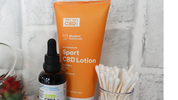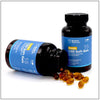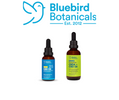CBDA vs CBD: What You Should Know About the Next Frontier of Hemp Wellness
For many people exploring hemp wellness, CBD has become a familiar starting point. It’s widely known for supporting relaxation, sleep, and overall balance, and has grown into one of the most trusted natural supplements available today. But as research deepens, another cannabinoid is gaining attention - CBDA, which stands for cannabidiolic acid.
Unlike CBD, which is created when raw hemp is heated or processed, CBDA is the plant’s natural precursor compound. Early studies suggest that CBDA may offer unique benefits of its own, making it an exciting area of exploration for those who want to get the most out of their hemp routine.
Understanding CBDA vs CBD isn’t just about comparing two cannabinoids. It’s about choosing the right product for your wellness goals. In the sections ahead, we’ll break down the science, the differences, and how to decide which option (or combination) fits best for you.
Key Takeaways
-
CBD is the well-researched staple for relaxation, sleep, and recovery, while CBDA shows exciting promise for mood, stress, and digestive support.
-
CBDA is the raw form found in hemp, while CBD is created when CBDA is heated or processed.
-
Preliminary studies suggest CBDA could influence serotonin activity and play a role in maintaining a balanced inflammatory response.
-
Full-spectrum hemp extracts offer both, so you don’t have to choose between CBDA vs CBD; you can enjoy them together through the entourage effect.
-
Quality matters most — always look for trusted brands like Bluebird Botanicals that provide third-party lab testing, clear labels, and clean formulations.
Try Bluebird Botanicals’ Trusted CBD + CBDA Products Today
What is CBD? A Quick Refresher
CBD (cannabidiol) is one of the most well-known compounds found in hemp. Unlike THC, CBD is non-intoxicating — meaning it won’t make you feel “high.” Instead, it’s widely used to support everyday wellness, including relaxation, stress management, sleep quality, and recovery after exercise.
Over the past decade, CBD has become available in many forms: oils, gummies, lotions, and more. Each product type offers a slightly different experience, but all work by interacting with the body’s endocannabinoid system (ECS) — the network of receptors that helps regulate mood, sleep, and overall balance.
Today, consumers can choose from several categories of CBD products:
-
Full-Spectrum CBD – includes a wide range of hemp compounds, including minor cannabinoids and terpenes, for the entourage effect.
-
Broad-Spectrum CBD – similar to full-spectrum but with THC removed.
-
CBD Isolate – pure CBD, without any other cannabinoids or plant compounds.
This variety gives people the flexibility to match a CBD product with their specific needs.
What is CBDA? The CBD Precursor Explained

When comparing CBDA and CBD, it helps to understand where each cannabinoid comes from. CBDA (cannabidiolic acid) is the raw, unheated form of CBD that naturally occurs in hemp. Fresh hemp plants are rich in CBDA, but once exposed to heat or processing, this compound converts into the more familiar CBD.
This difference in origin is important for wellness seekers. While CBD is well-studied for supporting relaxation, sleep, and balance, early research suggests CBDA may work through slightly different pathways, particularly serotonin receptors. That could mean unique benefits for stress, mood, and digestive health compared to CBD.
As interest in CBDA and CBD grows, more companies are exploring ways to preserve CBDA in oils, tinctures, and raw hemp extracts. Choosing these products allows you to experience cannabinoids in a form that’s closer to how they exist naturally in the plant.
Also Read: CBD Near Me: How to Find the Best CBD Products Locally and Online (Complete Buyer’s Guide)
CBDA vs CBD: What Are the Key Differences?
When looking at CBDA vs CBD, the main distinction comes down to how each cannabinoid exists in the hemp plant and how they interact with the body. CBD is well established as a daily wellness supplement, while CBDA is still being studied but showing unique promise.
Here’s a quick side-by-side comparison:
|
Aspect |
CBDA |
CBD |
|
Where It Comes From |
Found naturally in raw hemp before heating |
Formed when CBDA is heated (decarboxylated) |
|
Interaction in the Body |
May act on serotonin receptors and other pathways |
Primarily interacts with the endocannabinoid system (ECS) |
|
Common Benefits |
Stress resilience, mood balance, digestive wellness (early findings) |
Relaxation, sleep, muscle and joint recovery, and everyday balance |
|
Availability in Products |
Found in raw hemp extracts, select oils, or specialized products |
Available in oils, gummies, lotions, gels, and more |
Why These Differences Matter
For many people, the decision between CBDA and CBD comes down to what they want from a hemp product. If you’re looking for tried-and-true support for relaxation, sleep, or recovery, CBD remains the go-to choice. But if you’re curious about hemp’s untapped potential, CBDA may offer complementary benefits that set it apart.
Potential Benefits of CBDA (vs. CBD)
Recent scientific findings reveal that CBDA isn’t just an obscure precursor; it may offer distinct advantages supported by growing research.
What Studies Are Showing
Research highlights several areas where CBDA may shine:
-
Neuroprotection
Preclinical research suggests CBDA may help support motor neuron health and promote a balanced inflammatory response. -
Anti-nausea support
CBDA appears significantly more potent than CBD at reducing nausea and vomiting by acting on serotonin receptors, making it promising for digestive comfort and stress-related nausea. -
Muscle and Joint Support
CBDA has been studied for its interaction with pathways that may influence comfort and mobility. This suggests potential benefits for overall muscle relaxation and joint well-being, supporting an active lifestyle.
-
Immune Support potential
Laboratory research indicates CBDA may block certain viruses from entering human cells, opening the door to possible immune-supportive applications. -
Broad therapeutic potential
In addition, preliminary studies are investigating CBDA’s potential role in supporting calm and emotional balance.
How to Choose Between CBDA and CBD Products

When deciding on CBDA and CBD, it helps to think about your personal wellness goals and how you want to incorporate hemp into your daily routine. Both cannabinoids offer valuable support, but their strengths may align with different needs.
When CBD May Be the Better Choice
CBD is a reliable option if you’re looking for:
-
Relaxation and stress relief in daily life
-
Better sleep quality without morning grogginess
-
Post-exercise recovery and muscle comfort
-
A broad range of product options, including oils, gummies, softgels, and creams
Bluebird Botanicals offers a variety of CBD oils and gummies designed to fit seamlessly into everyday routines, making CBD accessible for both new and experienced users.
Also Read: What is CBD? Separating Fact from Fiction + How to Use it Safely
When CBDA Might Be Worth Exploring
CBDA may be appealing if your goals include:
-
Supporting digestive comfort or easing nausea
-
Exploring cannabinoids with potential mood-balancing benefits
-
Adding variety to your hemp routine beyond CBD alone
-
Staying at the forefront of innovative hemp wellness
Some of Bluebird’s full-spectrum hemp extracts naturally retain CBDA alongside CBD, allowing you to benefit from both in one product.
Do You Have to Choose One?
The truth is, you don’t necessarily need to pick a side in the CBDA vs CBD discussion. Many full-spectrum products deliver both cannabinoids together, offering the best of both worlds. This synergy is often referred to as the entourage effect, a concept that suggests hemp compounds work best when they’re preserved and combined in their natural state. Instead of isolating one cannabinoid, full-spectrum formulas allow CBD, CBDA, and other plant compounds to interact, potentially enhancing their overall benefits.
Why Pairing May Be Better
-
Broader Support – CBD is well known for relaxation and sleep, while CBDA may offer added support for stress resilience, mood balance, and digestive comfort.
-
Natural Balance – Together, they represent hemp’s full potential, closer to how the plant exists in nature.
-
Convenience – With the right product, you don’t need to buy CBD and CBDA separately.
Where to Find Both in One Product
Bluebird Botanicals makes this easy with full-spectrum hemp extracts that naturally retain CBDA alongside CBD. This means you can enjoy the grounding effects of CBD plus the emerging benefits of CBDA — all in one daily serving.
Try Bluebird Botanicals’ Trusted CBD + CBDA Products Today
What to Look for When Shopping
Whether you’re deciding between CBDA and CBD or looking for a product that combines both, the most important factor is quality. Not all hemp products are created equal, and choosing carefully ensures you get the benefits you’re looking for.
Key Things to Check Before You Buy
-
Third-Party Lab Testing
Look for Certificates of Analysis (COAs) that verify the cannabinoid content and confirm the product is free from pesticides, heavy metals, and other contaminants. -
Accurate Labels
A trustworthy product should clearly list whether it’s full-spectrum, broad-spectrum, or isolate, along with the exact amount of CBD and other cannabinoids like CBDA. -
Source and Extraction
Hemp quality matters. Products made with clean, responsibly grown hemp and gentle extraction methods will preserve more beneficial plant compounds. -
Formulation Transparency
Whether it’s gummies, oils, or softgels, you should know what else is in the product, especially if you’re looking for sleep gummies without melatonin or clean-label formulas.
At Bluebird, every batch of CBD oil, gummies, and full-spectrum hemp extract is tested by independent labs, with results published openly for customers to review. This commitment to quality, transparency, and clean ingredients makes it easier to shop with confidence - whether you’re exploring CBD, CBDA, or a blend of both.
CBDA vs CBD: Final Thoughts
The comparison between CBDA and CBD isn’t about declaring a winner. It’s about understanding how each cannabinoid can play a role in your wellness routine.
CBD remains the most popular choice for relaxation, better sleep, recovery, and everyday balance. CBDA is showing exciting potential in areas like stress resilience, mood support, and digestive comfort, with research continuing to expand.
Together, they may deliver even greater benefits through the entourage effect, especially in full-spectrum hemp extracts that preserve both.For anyone curious about which option is best, the answer depends on your wellness goals.
Fortunately, you don’t always have to choose. Bluebird Botanicals offers CBD oils, gummies, softgels, and full-spectrum hemp products that naturally contain CBDA as well, giving you a well-rounded approach to hemp wellness.
In the end, whether you’re starting with CBD or exploring CBDA, the most important step is choosing products you can trust. With Bluebird’s commitment to quality and transparency, you can feel confident knowing your hemp routine is rooted in both nature and science.
CBDA vs CBD: Frequently Asked Questions (FAQ)
1. How is CBDA created in the hemp plant?
CBDA is produced naturally in raw hemp before processing. When the plant is exposed to heat, CBDA converts into CBD through a process called decarboxylation.
2. Does CBDA show up on a drug test like CBD?
Neither CBD nor CBDA alone should cause a positive result on a standard drug test, but full-spectrum hemp products may contain trace amounts of THC. Always check product labels and third-party lab results if THC is a concern.
3. What makes CBDA vs CBD unique in terms of absorption?
Some studies suggest CBDA may have higher bioavailability than CBD, meaning the body could absorb it more efficiently. However, more research is needed to confirm how this plays out in humans.
4. Are there side effects of taking CBDA?
CBDA is generally well-tolerated, much like CBD. Some people may experience mild digestive discomfort or drowsiness at higher amounts. Always start with a small serving to see how your body responds.
5. Can pets take CBDA or CBD?
CBD products designed specifically for pets are becoming popular for supporting calm and comfort. While CBDA is less studied in animals, full-spectrum hemp extracts containing both CBD and CBDA may provide gentle support. It’s best to choose products formulated for pets and consult your veterinarian.
6. Where can I find CBDA vs CBD products?
CBDA is less common, but full-spectrum hemp extracts from trusted companies like Bluebird Botanicals naturally retain CBDA alongside CBD. This allows you to access both cannabinoids in one high-quality product.
Disclaimer:
This article is for informational purposes only and is not intended to diagnose, treat, cure, or prevent any medical condition. The statements regarding CBD and sleep have not been evaluated by the Food and Drug Administration (FDA). Please consult with a healthcare professional before starting any new supplement.









